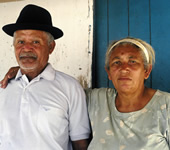 |
Irinéia Rosa Nunes da Silva was born in 1948, in the community of Muquém, in the area of União dos Palmares (AL). “Since I can remember people around here have made pots. My mother used to make them, so did my grandmother, and before her almost every woman was a potter.”
Her husband, 64-year-old Antônio Nunes, confirms the story. “I used to make roof tiles, moulding them on my thigh. My mother made pots and so did my first wife.”
But there’s one thing Mrs. Irinéia likes to remember: “I always made small pieces on the side to play with. Animals, little pots and pans, dolls. I always enjoyed these things more than the big pots. One day someone asked me to make them a little bigger. Government people also started placing orders. It’s great, because I enjoy making them. But at first people made fun of me. They used to say they were voodoo dolls. But we are from the land of Zumbi (Brazilian slave hero), he’s our ancestor and these things are in our history. When the others realised I was selling my stuff to city people they stopped laughing.”
Today, around 12 people in the small village of Muquém live by working with clay. Mrs. Irinéia says many have had to stop because of the lack of space to work. “We are waiting for the workshop the government promised us. We are very poor, and no one can afford to have a room at home to work with clay. We only get money when visitors come. Otherwise the pieces are taken to Maceió (AL) and we only get paid after they are sold. That’s why we have to carry on working the land, and the young people work in the sugar cane plantations or in the sugar factory. But I’m happy. The government has chosen me to become a teacher. I will teach those who want to learn and will get paid for that!” She deserves to get paid, having worked hard since her childhood. Hopefully her lessons will create new Irinéias, full of life and courage. |


